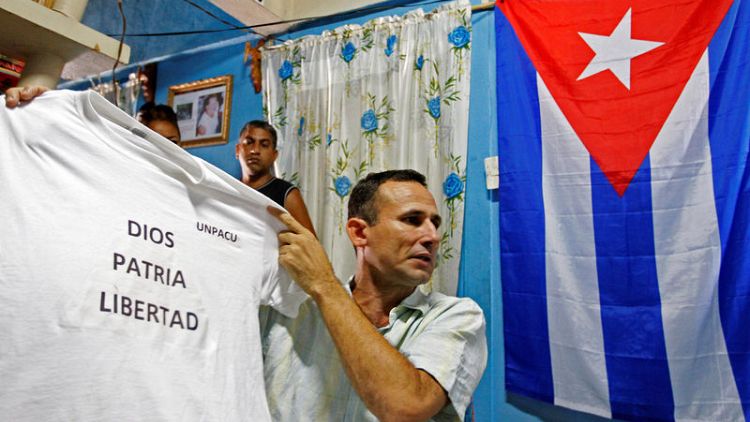HAVANA (Reuters) - The European parliament joined the United States on Thursday in condemning Cuba's detention and reported mistreatment of leading dissident Jose Daniel Ferrer, whom the Communist government in Havana calls a U.S.-backed counterrevolutionary.
The move came a day after Cuban state television aired a report including footage from hidden cameras in Ferrer's jail cell apparently showing him in good health and falsely accusing a guard of hurting him.
Activists from his opposition organisation the Patriotic Union of Cuba (UNPACU) said the footage could have been staged or doctored.
Authorities arrested Ferrer, 49, two months ago on charges of assault, which his relatives and UNPACU said was an excuse to silence him.
"They are slandering my son and so preparing the way to condemn him," Amelia Garcia Vega, Ferrer's 76-year-old mother who lives in Florida, told Reuters by phone. "He is innocent. My son is not a delinquent and does not attack anyone."
While the European Union parliamentary resolution is non-binding and will unlikely derail the bloc's drive to normalise relations with Cuba, it underscores concerns about what some activists say is worsening repression in the one-party state.
The resolution states that lawmakers are concerned about "persecution, harassment, attacks against peaceful dissidents, independent journalists, human rights defenders and political opposition in Cuba".
It notes an EU cooperation agreement with Cuba "includes a provision to suspend the agreement in the event of human rights violations".
Cuba says the Trump administration is using Ferrer to undermine the government as part of its attempt to overthrow socialism in Latin America.
It accused the top U.S. diplomat in the island, Mara Tekach, of directing his activities. Wednesday's TV report showed her visiting Ferrer's home and said she was "inciting him to disrespect the forces of public order".
The U.S. government has denied the allegations and said it is simply carrying out a mission to support Cuba's rights defenders.
This month the U.S. embassy in Havana posted a video on social media in which Tekach appeared with Ferrer's wife, who accused authorities of torturing her husband and allowing his health to deteriorate so much he could not even embrace her during a visit.
Cuba's government has until recently been able to tightly control the flow of information on the island and it does not usually comment on the detention of dissidents or their activities, which would give them more publicity.
But internet access has expanded vastly in recent years and Cuban activists, international rights organizations and the U.S. government have waged an intense campaign for Ferrer's release.
In the most controversial section of the state TV report, Ferrer could be seen hitting his head on a desk then accusing a guard of harming him.
The report also included Cubans saying Ferrer has hit them.
Ferrer was one of the 75 dissidents arrested in 2003 during a nationwide crackdown known as the Black Spring. He was released on parole in 2011 and soon after formed UNPACU.
(Reporting by Sarah Marsh and Nelson Acosta in Havana; Additional Reporting by Jan Strupczewski in Brussels; Editing by Daniel Wallis)
